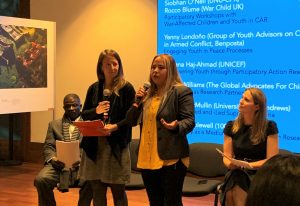In November 2019, Watchlist hosted its Colombian partner organizations COALICO and Benposta Nacion de Muchach@s to share experiences and good practices on child participation in policy and programming decisions with international policymakers in New York. In particular, the partners highlighted the importance of integrating children’s perspectives into peace processes and the development of effective rehabilitation and reintegration programs for children formerly associated with armed forces or armed groups.

© 2019/Watchlist on Children and Armed Conflict.
On November 25, Ms. Yenny Londoño – a child rights advocate and former child soldier from Colombia – spoke at a side event entitled, “Nothing About Us Without Us: Participatory Policy Research with Children and Youth Affected by Conflict.” Organized by War Child UK and United Nations University (UNU), the event examined child and youth participation in research, policy, and programming decisions. Ms. Londoño, who was the invited civil society speaker at the Security Council’s 2018 open debate on children and armed conflict, spoke about her experience representing child victims of the armed conflict at peace talks between the Colombian government and the Fuerzas Armadas Revolucionarias de Colombia – Ejercito del Pueblo (FARC-EP). Other expert panelists included Mr. Kabba Williams, a child rights activist and former child soldier, who spoke about his experience conducting participatory research with affected youth in his home country of Sierra Leone.
On November 26, Ms. Londoño spoke at an Arria Formula meeting (an informal briefing of the Security Council) on the reintegration of children associated with armed forces and armed groups. The Arria meeting – entitled “Bridging the Humanitarian-Development-Peace (HDP) Nexus, including by taking into account children’s views in designing and implementing re-integration programmes,” was sponsored by the permanent missions of Belgium, Peru, Poland, and the United Kingdom to the United Nations, in collaboration with War Child UK and UNU. Ms. Londoño spoke about her experiences of reintegration and rehabilitation, as well as her role in the Colombian peace process.
Other panelists included the Special Representative of the Secretary-General for Children and Armed Conflict (SRSG-CAAC), UNICEF, the UN Peacebuilding Support Office, and Dr. Siobhan O’Neil, project director of UNU’s Centre for Policy Research (UNU-CPR). Dr. O’Neil spoke about a pilot project of UNU and War Child UK in the Central African Republic (CAR), which brought together children formerly associated with armed forces or armed groups and other war-affected youth to explore the lived experience of exiting armed conflict in CAR, what young people asp
ire to, and what types of assistance would help them achieve their goals.
Through its Partnerships Program, which seeks to strengthen local civil society capacity on monitoring and reporting and participation in the UN-led Monitoring and Reporting Mechanism (MRM), Watchlist has been collaborating with the Coalition against the Involvement of Boys, Girls, and Youth in the Armed Conflict in Colombia (COALICO) since 2003. Benposta, a member organization of COALICO, provides support to children and youth affected by the armed conflict in Colombia. It hosts a Group of Youth Advisers on Children and Armed Conflict – themselves former child soldiers – who advocate for the protection of children’s rights in the Colombian armed conflict, including the strengthening of child participation in decision-making.



